|
|
|
Sort Order |
|
|
|
Items / Page
|
|
|
|
|
|
|
| Srl | Item |
| 1 |
ID:
189989
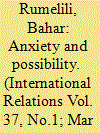

|
|
|
|
|
| Summary/Abstract |
This is the introduction to the forum, Anxiety and possibility: the many future(s) of COVID-19. It summarizes the contributions within a common framework and situates them in the extant literature.
|
|
|
|
|
|
|
|
|
|
|
|
|
|
|
|
| 2 |
ID:
155455
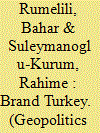

|
|
|
|
|
| Summary/Abstract |
Since the 2000s, Turkish policymakers and private sector interests have combined representations of Turkey as both Western and Eastern with a branding approach to identity in foreign policy, trade and investment promotion, and cultural sector activities. This article analyses how the commodification of its liminal identity as a dual identity allowed Turkey to invoke different aspects of its identity in the West and the East in ways that catered to both audiences and enabled the pursuit of different political and economic objectives. However, the article also notes how this branding strategy was limited by the national identity debates and dominant geopolitical discourses that continued to situate the West and East as mutually exclusive and binary opposite identity markers. Overall, the case of Turkey underscores the complex relationship between branding, identity, and discourse, which has thus far received scant attention in the literature.
|
|
|
|
|
|
|
|
|
|
|
|
|
|
|
|
| 3 |
ID:
160615
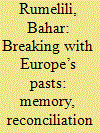

|
|
|
|
|
| Summary/Abstract |
The European Union is widely credited for consolidating a democratic “security community” in Europe, and bringing about a definitive break with war-torn and authoritarian/totalitarian pasts in many European countries. Drawing on recent discussions in ontological security studies, this article points out that these radical breaks may have come at the expense of ontological insecurity at the societal and individual levels in Europe. While conventional teleological narratives often treat reconciliation and breaking with the past as automatic by-products of European integration, ontological security theory calls for greater attention to the societal tensions and anxieties triggered by these transformations and how they are being managed –more or less successfully – through reconciliation dynamics and memory politics in different societal settings. Illustrating the variation in a number of cases, this article claims that a systematic comparative analysis of the different dynamics of reconciliation and memory politics in different European societies is central to analyzing European integration from an ontological security perspective.
|
|
|
|
|
|
|
|
|
|
|
|
|
|
|
|
| 4 |
ID:
189990
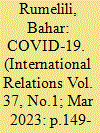

|
|
|
|
|
| Summary/Abstract |
This contribution to the Forum, Anxiety and possibility: the many future(s) of COVID-19, develops a conception of uncertainty as constituted by cognitive (awareness of possibilities) and affective (mood in which possibility is encountered) dimensions. Based on this conception, it is suggested that the COVID-19 crisis has led to a qualitative leap in our already growing sense of uncertainty, both accentuating our awareness of possibilities that are unforeseen, and rendering us attuned to the world in anxiety rather than fear.
|
|
|
|
|
|
|
|
|
|
|
|
|
|
|
|
| 5 |
ID:
185241
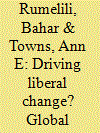

|
|
|
|
|
| Summary/Abstract |
The existing literature on Global Performance Indices (GPIs) is mostly dominated by unit-level analyses focused on specifying the relevant properties of the GPIs and the motivations of state actors in being influenced by GPIs. This article advances a systemic approach, which conceives of GPIs as collectively constituting a system of normative stratification in International Relations (IR). By bringing together the literature on GPIs with the relevant IR literatures on international hierarchies and status-seeking, we identify the structural attributes of the GPI-based system of stratification, how these structural attributes shape the distribution of normative status positions among states, and how this distribution is likely to condition the pursuit of status by states. In particular, we argue that the disaggregated structure and relative ranking of states, respectively, generate status ambiguity and immobility, which both dissuade states from seeking higher moral status through improving their scores in the existing indices. We illustrate the patterns of status ambiguity and immobility present in the GPI-based system of stratification through an empirical analysis of the scores and rank positions of the United States, European Union (EU) members, and “rising powers” in five different indices in the past decade.
|
|
|
|
|
|
|
|
|
|
|
|
|
|
|
|
| 6 |
ID:
112409
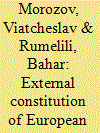

|
|
|
|
|
| Publication |
2012.
|
| Summary/Abstract |
The view of identities as always situated in a relationship with the Other underlies contemporary constructivist social theory. Taking a step further, and combining constructivist approaches to identity with insights from post-colonial studies, this article argues that the Other, far from being a mere presence, often plays an active role in identity politics. By tracing the historically varying ways in which Turkey and Russia have engaged in European identity construction, it demonstrates that this is an interactive process of negotiation between the European Self and its external Others in which agency of the Other is revealed. In particular, Russia and Turkey exercise agency by challenging, each in its own manner, the EU's power to define the normative meaning of Europe. While Turkey has contributed to a decentring of European identity by challenging the self-perception of Europe as a multicultural space, Russia's uncompromising stance tends to consolidate the EU-centred image of Europe as a political community based on liberal democratic values.
|
|
|
|
|
|
|
|
|
|
|
|
|
|
|
|
| 7 |
ID:
154746
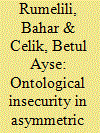

|
|
|
|
|
| Summary/Abstract |
This article contributes to the recent literature on ontological security in conflict studies by empirically investigating, through a case study of Turkey’s Kurdish issue, how ontological asymmetry complicates peace processes. Over time, all conflicts become embroiled in a set of self-conceptions and narratives vis-à-vis the Other, the maintenance of which becomes critical for ontological security. In ethnic conflicts, however, these conceptions and narratives also intersect with a fundamental ontological asymmetry, because such conflicts often pit state parties with secure existence against ethnic groups with contested status and illegitimate standing. We argue that peace processes are easier to initiate but harder to conclude in ontologically asymmetric conflicts. Accordingly, we find that during the 2009–2015 peace process in Turkey, ontological (in)security-induced dynamics presented themselves in cyclical patterns of ambitious peace initiatives receiving greater support among the Kurdish public but giving way, at the first sign of crisis, to a rapid and dramatic return to violence, which neither side acted to stem. Moreover, we underscore that ontologically asymmetric conflicts, such as Turkey’s Kurdish issue, are often characterized by a societal security dilemma, where the conditions of ontological security for one party undermine those of the other. Therefore, building consensus around a new shared peace narrative may not be possible or desirable, and a lasting solution to Turkey’s Kurdish issue depends on the development of an agonistic peace around coexisting, multiple and contestatory narratives.
|
|
|
|
|
|
|
|
|
|
|
|
|
|
|
|
|
|
|
|
|